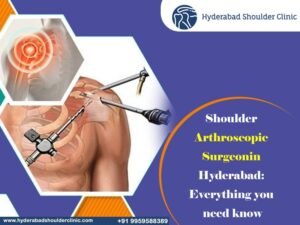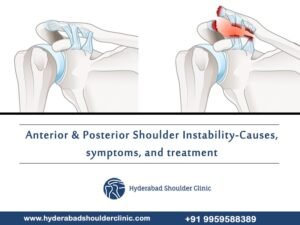Inflammation of your joints can be the result of degeneration called arthritis. This can cause symptoms ranging from stiffness, pain, loss of mobility to other consequences that can limit your lifestyle. The shoulder consists of three main bones – humerus, shoulder blade, and collarbone. Inflammation causes discomfort and limits the freedom of movement. This article addresses general questions about shoulder arthritis to help you know the symptoms, treatment options, and problems you might have.
Dr Chandra Sekhar. B from Hyderabad Shoulder Clinic is passionate about helping patients get out of pain, be mobile again, strengthen their joints, and confidently resume activities they enjoy. If you feel that there is arthritis in your shoulder, schedule an appointment with us.
Our team of orthopaedic surgeons offers treatments to make you fully mobile and active again. This article is to know about the answers to the Frequently Asked Questions About Shoulder Arthritis by my patients.
What is shoulder arthritis?

Shoulder arthritis is damage to the cartilage in the shoulder joint. The shoulder has two joints. Shoulder arthritis usually refers to the ball and the larger socket, called the glenohumeral joint, after the bones connect (glenoid and humerus). Cartilage covers the ball and socket.
When the cartilage in the shoulder collapses on the surface in the deeper layers, people talk about the shoulder’s arthritis. The second joint in the shoulder, acromioclavicular or AC joint, can also develop arthritis, known as AC joint arthritis.
How does shoulder arthritis develop?

Shoulder arthritis is usually the result of the gradual use of cartilage. Cartilage is present in every joint in the body; It covers the bone surface inside the joint, similar to Teflon on ball bearings. Cartilage is living tissue with a thickness of 2 to 3 millimetres – about one or two thick layers of cardboard. It softens contact between bones. If the cartilage is intact, it can make many turns without the surface’s wear because it is smooth.
Shoulder arthritis usually develops gradually.
- The cartilage first softens
- Then develops cracks on the surface
- Then begins to “fibrillate” (deteriorate)
- Finally wear to expose the surface of the bone
As a result, it loses its ability to act as a smooth sliding surface.
Cartilage does not immediately wear out on the entire bone surface in the joint. Instead, it wears in various parts at different rates. As soon as the surface becomes uneven, the cartilage can suffer further damage. This can begin to thin out, eventually causing the shoulder bones to rub against each other (loss of fourth stage cartilage). Many people think of arthritis as bone-to-bone rubbing in a joint, but in reality, arthritis is a process that can lead to bone-to-bone rubbing .
It’s impossible to say how quickly shoulder arthritis will worsen. Everyone’s shoulder joints have different cartilage damage. When certain activities cause pain, it usually means the cartilage is stressed. In general, the more painful the activity, the more likely the cartilage and shoulder joint will be damaged.
What are the symptoms of shoulder arthritis?

- It causes pain in:
- Front, side or back of the shoulder
- During shoulders movement
- At night or in the morning
- When you sleep/after you wake up
- When lifting or carrying heavy objects
- Worse after exercise
- Softness
- Reddish
- Warmth in the joints
- Swelling and inflammation
- Loss of freedom of movement
- Grind, click or crack sensations
- Lock or sliding the shoulder joint in a certain position
- Rigidity
- Fatigue
- Fever
- Numbness
What are the types of arthritis of the shoulder?
There are two joints in the shoulder:
- The acromioclavicular (AC) joint
- The glenohumeral joint.
Your shoulder can experience a lot of wear, but once your shoulder joints show symptoms of pain, swelling, and limited mobility, you are more likely to develop arthritis in your shoulder.
To give you effective treatment, your doctor needs to determine the type of arthritis you have. The most common types of shoulder arthritis are listed below:
Rheumatoid Arthritis (RA):

In patients with rheumatoid arthritis symptoms, a chronic inflammatory disease of the joints can cause erosion and humerus deformity. Their immune system’s effects on synovium (the thin membrane lining your bones at the ends where they meet to make your joints) and result in synovitis
Rheumatoid arthritis has symmetrical joint involvement. If one shoulder is affected, there is a high probability that the corresponding joint symptoms will appear on the other side of the body. This means you don’t have RA on only one shoulder, thigh, arm, or knee, but maybe both (or more). There are many other types of arthritis. Most of them, including rheumatoid arthritis, are treated with disease modifying drugs to prevent your immune system from attacking the synovial mucosa of the joints.
Osteoarthritis (OA):
A degenerative disorder, also known as wear arthritis that damages delicate articular cartilage in the shoulder bones. This is the most common arthritis in the shoulder and is more common in the AC joint than in the glenohumeral joint and is usually diagnosed in humans for more than 50 years. The degenerative nature of OA causes the rough bones to wear outwhen the shoulders rub against each other, which causes wrong movements in the joints.
Osteophytes (bone spurs) play a major role in causing shoulder joint malalignment in OA. Your shoulder loses freedom of movement and leads to pain and weakness when trying to move your arms.
Post-traumatic arthritis:
If a shoulder injury occurs, there is a chance that you will have arthritis in the shoulder joint. This type of arthritis is known as post-traumatic arthritis (PA) because shoulder injuries are usually caused by shoulder joint instability and the consequences of this instability. Fluid can accumulate in your shoulder joints, cause pain and swelling, and cause the shoulder to develop PA. Trauma due to sports injuries and other accidents can also cause this condition.
How shoulder arthritis changes your life?
Nearly all people who live with shoulder arthritis find that this affects their lives in several ways. This can affect their daily activities, work, financial resources, or relationships with family and friends.
Arthritis is not easy to overcome, but there are many things you can do to change, overcome, or manage its associated problems. Your doctor can recommend special exercises, medications, joint protection techniques and devices, and other self-medication activities. It is also important to maintain a positive attitude as a positive attitude allows you to see solutions to your problems better.
Can I prevent Shoulder arthritis?

Fortunately, some types of shoulder arthritis can be prevented. If you take care of your body now, it will give you life without pain for years as you get older. Some steps you can take to prevent arthritis are:
- Do regular exercise
- Maintain a healthy weight
- Sit in a good posture
- Stay well hydrated
- Avoid the consumption of cigarettes and alcohol
- Eat a balanced diet that is rich in omega-3 fatty acids
Can shoulder arthritis cause numbness?
Numbness is often a symptom of nerve damage. For example, tingling in the hands can be associated with nerve irritation in the neck. In such situations, turning or bowing the head to the affected side can make symptoms worse. For example, a pinched nerve on the right side of the neck can cause numbness in the arms and arms when someone tries to look back through the right shoulder. When nerve irritation increases, the arms can become weak. Physical x-ray and MRI examination of the neck and electrodiagnostic tests can help in diagnosis.
How to diagnose shoulder arthritis?

It is important to know what type of arthritis you have because the treatment is different for each type. Early diagnosis and treatment of arthritis are important to slow down or prevent further joint damage if left untreated. To go further, it would be more appropriate to explain the type of arthritis you have. Because it sometimes takes a long time to diagnose the type of arthritis clearly, it is important to plan your arthritis consultation as soon as possible if you think there is arthritis on your shoulder.
Your doctor will examine the damaged joint and looks for:
- Pain level
- Range of motion
- Grinding weight
- Joint weakness
- Softness to the touch
- Swelling and rashes
Your doctor will also carry out several laboratory tests on damaged joints. Laboratory work is usually done when your doctor is worried about arthritis. This can include blood tests or synovial fluid.
- X-rays or expanded images such as MRI or CT scan the doctor looks for:
- Loss of joint space
- Bone cysts and spurs
- Bone quality
- Wear bones
- Soft tissue integrity, especially rotator cuffs
Are there treatments for shoulder arthritis?

Arthritis can be treated. The main goal of arthritis treatment is to minimize pain and inflammation. Your doctor can recommend one or more of the following treatment options for the best results:
- Rest
- Hot or cold treatment
- Analgesics and anti-inflammatory drugs
- Drug injection
- Physical therapy
- Operation
Surgery:

If non-surgical treatments cannot relieve symptoms, your doctor can recommend one of the following surgical treatments. If conservative measures fail, surgery can help ease pain and increase shoulder movements.
- Joint replacement surgery: Also known as arthroplasty, this involves replacing the shoulder blades and glenoid sockets with prosthetic joints.
- Arthroscopy: Arthroscopy is less successful in glenohumeral arthritis. This is very successful in the treatment of acromioclavicular osteoarthritis. The surgeon uses a small incision to clean the shoulder joint. They insert a small camera in the joint; this camera instructs the surgeon to remove debris and bone spurs.
- Resection arthroplasty: This is mainly used to treat acromioclavicular joint arthrosis. 8-10 mm bone is removed surgically from your distal bone. Instead, scar tissue develops, which reduces pain caused by rheumatic clavicle bone rubbing against the rheumatic bone acromion.
Conclusion:
Inflammation from arthritis increases over time, aggravates pain, fatigue, lack of mobility, and a feeling of constant dissatisfaction. Although there is no cure for arthritis, especially shoulder arthritis, there are several treatment options that can help ease pain and treat your symptoms as mentioned above. If you experience any of the symptoms covered in this article, make an appointment today. Dr Chandra Sekhar. B will work with you to create a detailed treatment plan that will take you back to the activity you love the most.
If you have arthritis, contact Dr Chandra Sekhar. B. As the largest and most experienced shoulder surgeon in Hyderabad, our medical team can prescribe various treatment options to relieve your joint pain. If you live in Hyderabad, contact us to make an appointment at 9959588389.





